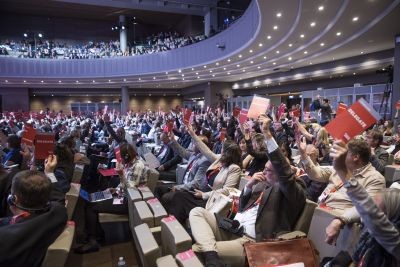
Emergency motion - Refugee crisis in Europe
Adopted at the ETUC 13th Congress on 30 September 2015
In recent months Europe has been experiencing a massive increase in numbers of people crossing our borders to seek protection from war and destruction in their own countries.
Many of these asylum-seekers risk their lives and the lives of their children and families in search of a peaceful and respectful environment to live in. The ETUC strongly condemns any measures that endanger their human dignity, human rights or physical integrity.
The barriers and fences that have been built recently have proved to be ineffective and have the sole impact of diverting flows from one route to another and playing into the hands of people-smugglers. Their use must be rejected.
We deplore the loss of lives of asylum-seekers crossing the Mediterranean and reiterate our call for the European Commission to continue search-and-rescue operations in order to provide effective humanitarian assistance to those at sea.
Long queues at asylum offices, overcrowded reception centres and improvised camps in many corners of Europe show how badly prepared and unwilling the countries have been to cope with this crisis. Austerity policies have added to the problems, making conditions even more difficult in the countries where refugees first arrive.
The ETUC supports the fundamental European values of respect for human life and dignity, and opposes populist and xenophobic attitudes. These values must be translated into action. To this end a genuine cooperation between EU Member States in accepting adequate numbers of refugees is essential, in line with the letter and spirit of the Treaties.
The ETUC calls for a proactive European asylum policy which respects internationally agreed protection standards, including the UN 1951 Convention on Refugee Status and its 1967 Protocol.
The Dublin Regulation must be overhauled. New rules should ensure that care for asylum-seekers is fairly shared between Member States and, as far as possible, take account of asylum-seekers' needs and choice of country of destination based on community, linguistic or family links, among other factors.
The ETUC calls for an urgent resettlement scheme which goes far beyond the 20,000 resettlements from third countries initially proposed by the European Commission.
The Council's decisions adopted on 22 September have to be welcomed. Relocation of 160,000 refugees can provide immediate relief to countries receiving extraordinary flows of international protection-seekers. In addition, financial aid to UN agencies will also help people camped in millions on the edges of conflict areas. However, the measures agreed by the Council provide only a partial response to the challenges that Europe is facing, and are far from achieving a permanent solution within a genuine European asylum policy. The ETUC encourages Member States to continue to work together in a spirit of constructive solidarity under the leadership of the European institutions. The ETUC condemns governments that are currently opting out of a common approach towards the relocation of asylum-seekers in Europe.
The ETUC calls for more effective cooperation for development with countries of origin. Democratic and economic development is key to removing the root causes of large-scale movements of people. The EU has a role to play in fostering this process.
The European Commission Agenda to cope with the refugee crisis may prove inadequate given the growing scale of the problem, especially on the East Balkan routes and in the Mediterranean Sea. More must be done: all people have the right to safety, economic security, religious and political freedom and access to quality health services and quality education within a society which protects those freedoms. The EU and its Member States should restore adequate levels of quality public services for all. Priority should be given to services that safeguard social cohesion, such as employment and housing. Reception and asylum processing centres need to be staffed by well-trained public-service workers.
With its 60 million members, the trade union movement in Europe remains a bulwark against all forms of intolerance and will continue to press for humanitarian responses to a humanitarian crisis. Where refugees are able to work, unions will recruit and represent them, and we will work with partners to provide humanitarian assistance to those who are not in work. The ETUC will cooperate with the International Trade Union Confederation is responding to a crisis that is global as well as European.
